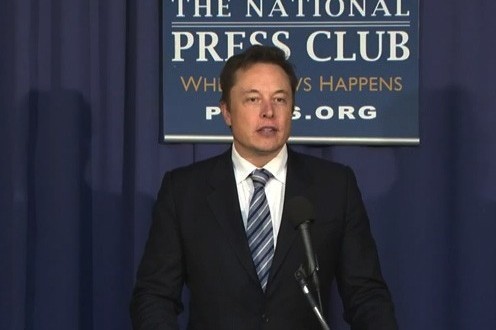SpaceX is filing a legal challenge to the U.S. Air Force’s latest Evolved Expendable Launch Vehicle (EELV) contract with United Launch Alliance (ULA), a joint venture of Boeing and Lockheed Martin.
The long-term contract, which guarantees the purchase of 36 rocket cores from ULA to be used in national security launches, was granted to ULA on a sole-source basis without any competition from other launch providers. SpaceX is seeking the right to compete for some of these same launches.
Musk said ULA has a monopoly over the national security launches.
Other rocket companies were not allowed to bid for the contract. Musk said he could launch military payloads — like GPS satellites — cheaper than ULA.
“The ULA rockets are basically four times more expensive than ours, so this contract is costing the U.S. taxpayers billions of dollars for no reason,” Musk said.
Musk also took jabs at ULA’s rocket engines, which are made in Russia. SpaceX rockets are made in America.
If SpaceX is allowed to compete for national security launches, Musk said they would launch those rockets from pad 40 at the Cape Canaveral Air Force Station.
NASA missions would be launched from pad 39A at the Kennedy Space Center.
However, Musk said that most of his commercial launches will most likely be moved to Texas, where SpaceX is hoping to set up a new launch facility.
Agencies/Canadajournal
 Canada Journal – News of the World Articles and videos to bring you the biggest Canadian news stories from across the country every day
Canada Journal – News of the World Articles and videos to bring you the biggest Canadian news stories from across the country every day



